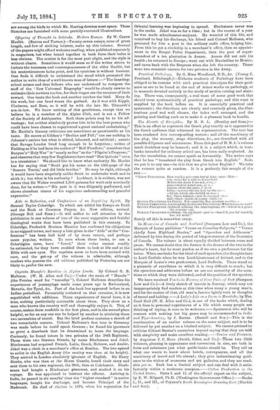Offspring of Thought in Solitude. Modern Essays. By W. Carew
Hazlitt. (Reeves and Turner.)—Twenty.seven essays, none of great length, and few of striking interest, make up this volume. Several of the papers might afford welcome reading, when published separately in magazines, but when bound together in book form their value is less obvious. The matter is for the most part slight, and the style is without charm. Sometimes it would seem as if the writer strove to imitate the terseness and contemptuousness of the elder Hazlitt, but his sententiousness lacks point, and his cynicism is without humour. One finds it difficult to understand the mood which prompted the author to write thus of a well-known man of letters :—" The boarding- school misses and dear fellows who are understood to compose the staff of the New Universal Biography' would be clearly unwise to estimate their services too low, for their wages are the measure of their reward. One beats the bush and another catches the bird. Many do the work, but one head wears the garland. As it was with Kipple, Chalmers, and Bose, so it will be with the late Mr. Titmarsh's son-in-law. We know nothing of this gentleman, except that we believe he is a member of the Alpine Club, and is not a Fellow of the Society of Antiquaries. Both these points may be to his ad- vantage; but neither absolutely proves him to be the best person who could have been chosen to superintend a great national undertaking." Mr. Hazlitt's literary criticisms are sometimes as questionable as his taste. He sneers at Gibbon's "Decline and Fall ;" can see nothing in Johnson's satires but what is stilted, laboured, and artificial ; asserts that Savage Lander lived long enough to be forgotten ; writes of Fielding as if he had been the author of " Moll Flanders;" considers that Bunyan' s " Holy War" is "nearly as fine " as the "Pilgrim's Progress;" and observes that very few Englishmen have read "Don Quixote " even in a translation ! We should like to know what authority Mr. Hazlitt has for saying that "Scott put his name on the title-page of the `Somers Tracts,' and did little besides." He may be right, although it would have been singularly unlike Scott to undertake work and to shirk it ; but what is his authority ? Lockhart, it is evident, was not aware that Sir Walter received 1,300 guineas for work only nominally done, for he writes:—" His part in it was diligently performed, and shows abundant traces of his sagacious understanding and graceful expression."
































 Previous page
Previous page